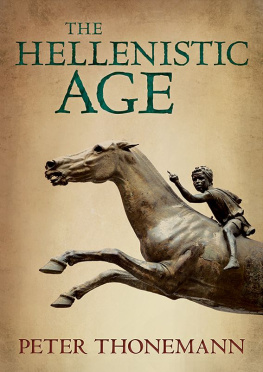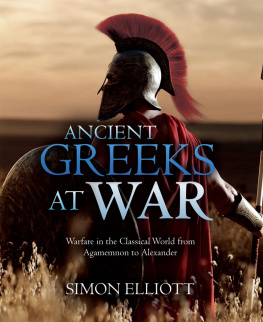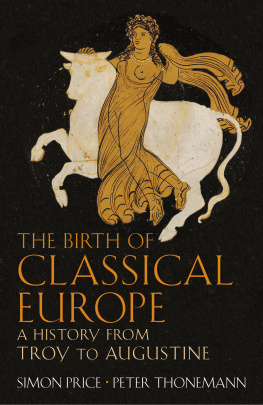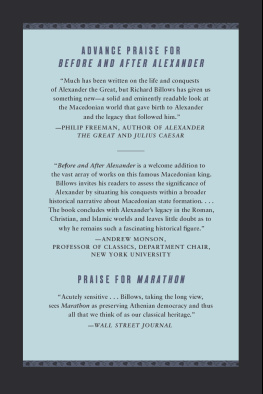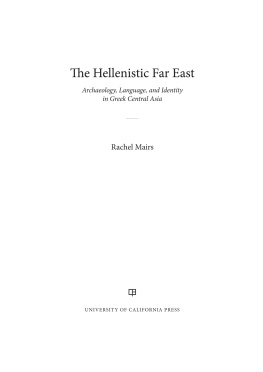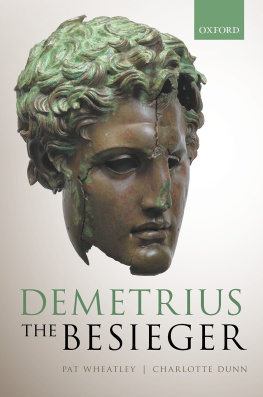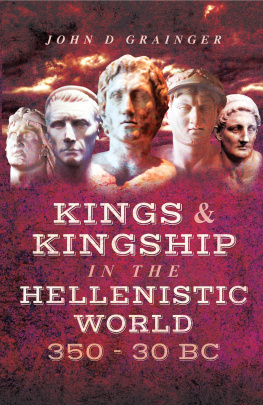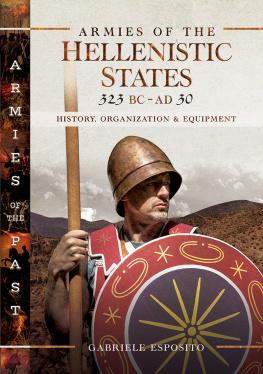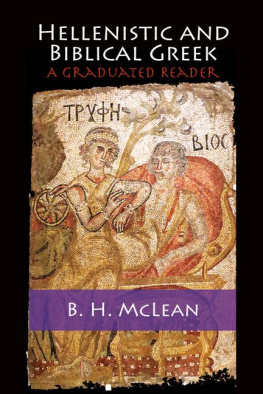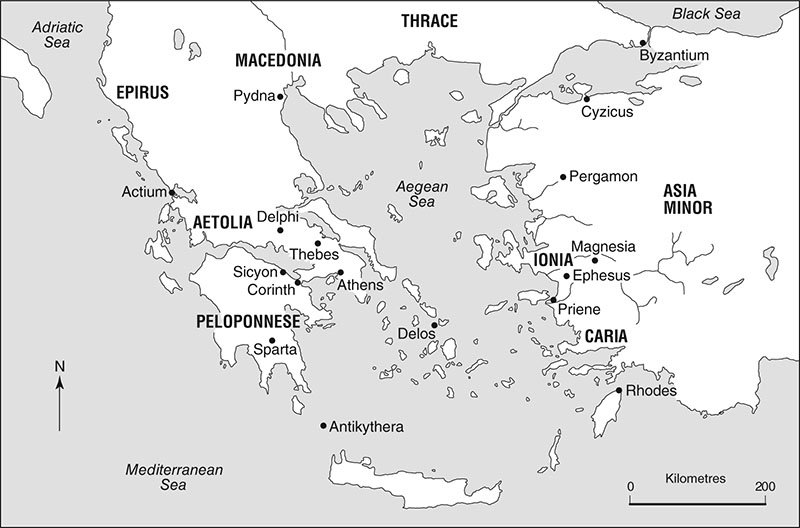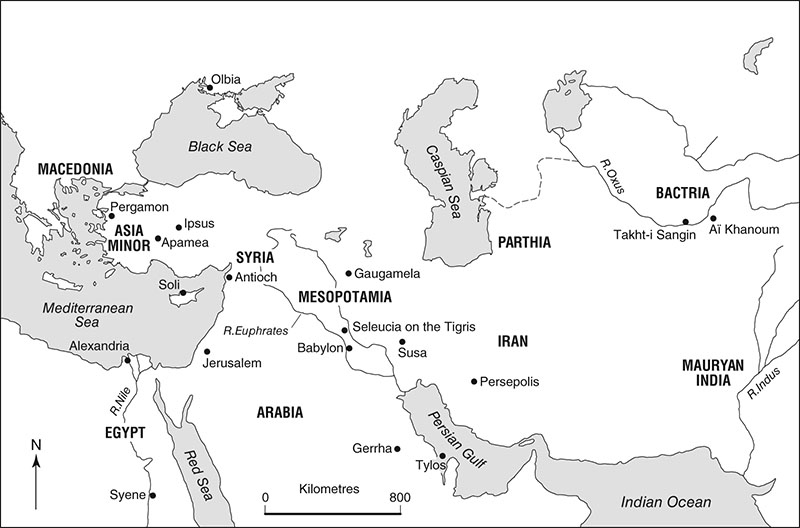Map 1 The Hellenistic Aegean.
The Man from Soli
Imagine a boy, born around 350 bc in the small Greek city of Soli on Cyprus. Like some 35 million others, he grew up as the subject of an Iranian king: Artaxerxes III of Persia, King of Kings, King of the four corners of the earth, ruler of Jews, Babylonians, Iranians, Egyptians, and Greeks (though not, it is true, all Greeks). The Persian empire, 200 years old, and stretching from the shores of the Aegean to the foothills of the Himalayas, must have seemed as stable as the heavens.
This boylet us call him Clearchuscame to manhood with the world shifting around him. In the spring of 334 bc , a Macedonian army, led by the young Alexander the Great, crossed into Asia. Cyprus itself fell to Alexander less than two years later, and by autumn 331, with the defeat of King Darius III of Persia at the battle of Gaugamela, the Persian empire of the Achaemenid kings had crumbled into history.
As Alexanders army marched on into the plains of Asia, Clearchus sailed west to Athens, where he studied philosophy at Aristotles Lyceum. He visited Apollos sanctuary at Delphi, where he carefully copied the gods oracular sayings (Know thyself; A friends affairs are ones own). He began to write, and he wrote about the strange new world starting to come into being: the religion of the Jews, Indian wisdom, the Persian Magi. Thanks to quotations preserved by later writers, we can still read a few fragments of Clearchus lost philosophical works, On Education, On Flattery, On Friendship and others.
In the summer of 323 bc , Alexander, king of the world, died at Babylon. Within a few months, Alexanders empire had already begun to fracture into regional fiefdoms in the hands of hard-faced Macedonian generals: Ptolemy in Egypt, Antipater (and later Cassander) in Macedon, Perdiccas (and later Antigonus) in Asia. But for a young man of an inquisitive disposition, the world was opening up. Other young men of Soli had already made unimaginable lives for themselves in the Greek New World: Stasanor of Soli ruled as the governor (satrap) of Drangiana in eastern Iran, and the sea-captain Hiero of Soli had explored the Arabian coast of the Red Sea as far as the Hormuz straits.
And so it was, in the first years of the third century bc , that the man from Soli set out for the East. All the lands from Syria to central Asia were now ruled by the greatest of Alexanders successors, King Seleucus I Nicator (the Conqueror). From the Syrian coast, Clearchus rode eastwards to the Euphrates; then downstream to the new Seleucid royal capital, Seleucia on the Tigris, a days journey south of modern Baghdad. He crossed the Zagros mountains, and skirted the northern flank of the Iranian desert, on the long and dusty road to worlds end: the great fortress of A Khanoum, on the banks of the River Oxus, in the far north-east of modern Afghanistan (described in ).
Here, Clearchus found a little community of Greeks, building a new city beneath the snows of the Hindu Kush, 5,000 miles from Delphi. The city had a Greek theatre, and a Greek gymnasium; part of a lost work by Aristotle survives on a scrap of papyrus from the palace treasury at A Khanoum. Where Clearchus went next we can only guess: perhaps he crossed over the mountains into India, or maybe he set out on the long path back to the Mediterranean. But he left his mark on the stones of A Khanoum. In the tomb-complex of the citys founder, Kineas of Thessaly, Clearchus set up a limestone column bearing the sayings of the Seven Sages of Greece, which he had laboriously copied at Delphi thirty years earlier: As a child, be well-behaved; as a young man, self-controlled; in middle age, just; in old age, a good counsellor; in dying, without grief. On the base of the column he had the following epigram inscribed:
These wise sayings of famous men of old
Are consecrated in holy Pytho (Delphi).
There Clearchus copied them carefully, and brought them
Here, to set them up, shining afar, in Kineas precinct.
The stone survives today, a little battered by nomad invasions, but with the letters as crisp and clear as the day they were cut (see ). Since 2006 it has travelled even further than Clearchus did, as part of a roving worldwide exhibition of treasures from the Kabul Museum: it has been on show at the Muse Guimet in Paris, the British Museum in London, and is due to spend 2016 on tour across Japan. If the museum guard looks the other way for long enough, you can run your finger across the name Clearchus, and reflect on a life less ordinary: beginning on the shores of Cyprus, and ending (perhaps) under the hard glare of a Bactrian sun. A Hellenistic life, if ever there was one.

